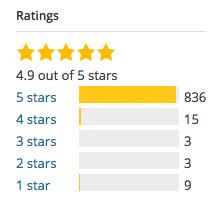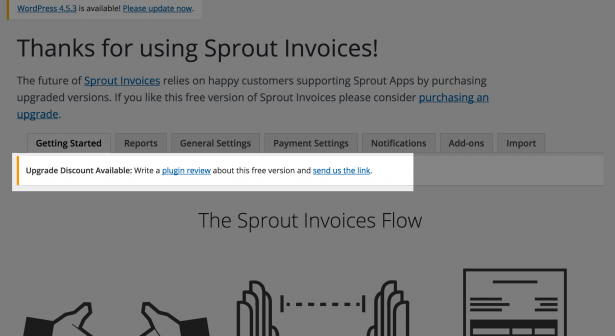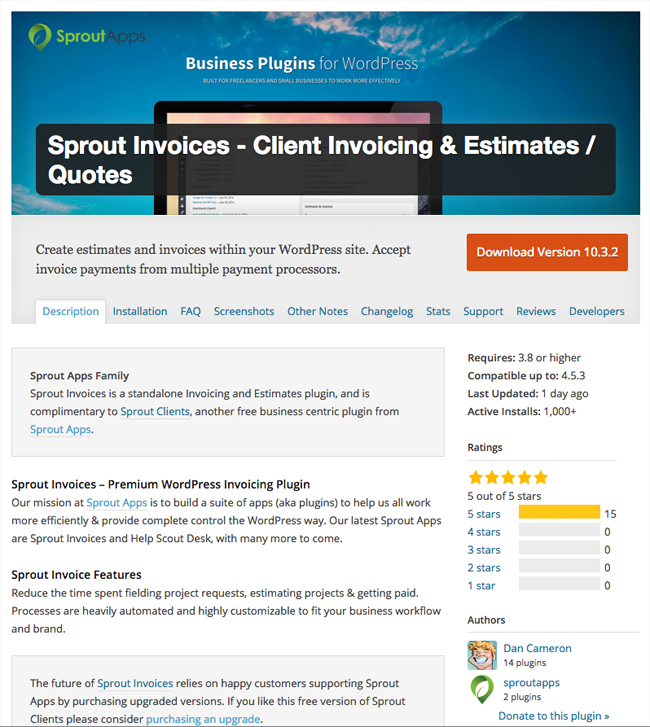Reviews are vital to the success of a product or service. Good reviews encourage people to buy. Bad reviews discourage them from buying.
In the WordPress world, reviews can make or break a developer’s product. Review ratings are prominently displayed next to themes and plugins on WordPress.org. They give website owners good feedback on the performance of the theme or plugin in question from other fellow WordPress users.

What happens when developers give an incentive to users to leave a positive review?
Should they be punished for trying to give users a reason for leaving a review?
This was something that we found out this week when Dan Cameron from Sprout Apps was punished by WordPress.org for trying to “defraud their ratings system”.
In his blog post “What Now? No Way? Huh?” Dan explained his surprise and frustration about the reaction from WordPress.org and why he was unhappy about them removing reviews of his WordPress plugin Sprout Invoices.
Sprout Invoices Encouraging Reviews Through Discounts
During my recent trip to Vienna for WordCamp Europe I was lucky enough to meet BlogVault owner Akshat Choudhary. He stressed that I should join the Advanced WordPress group on Facebook.
Tens of thousands of WordPress users and developers participate in the group every day. It was in this Facebook group that someone posted about Dan’s situation with Sprout Invoices.
The response in the group to what happened was split. Some people said that Dan was treated very unfairly. Many others, including myself, feel that the response by WordPress.org was just and fair.
To get a full overview of what happened, please read Dan’s blog post “What Now? No Way? Huh?“.
For those who are short on time, here is a brief overview of what happened.
- The plugin Sprout Invoices included an offer that gave users who published a review a discount on upgrading
- WordPress.org discovered this and stated that “bribery” was not allowed and refer the plugin author Dan Cameron to the detailed plugin guidelines
- In response to incentivising reviews, WordPress.org removed all five star reviews of Sprout Invoices on WordPress.org since they were effectively spam
- Dan Cameron states that this response is highly unfair and says that there is nothing in the plugin guidelines that states that this is now allowed
Dan comes across as a nice guy who is just trying to work hard and promote his product, however his surprise reaction to all of this highlights how his view on this situation is clearly biased.
As someone who does not have a dog in the fight, I feel differently to Dan about WordPress.org’s response.
Why I Feel Those Who Incentivise Reviews Should Be Punished
Dan states in his blog post that what he did was not bribery and that he was simply compensating users for the time they took to publish reviews.
It is a curious way to look at the situation.
By that same rational I should be allowed to compensate website owners who link to this blog as it takes them time to link here. As I am sure you are aware, I am not allowed to do that.
If I had to ask people to link to this blog in exchange for $10, Google would apply a penalty on this blog and I would lose all my search engine traffic. Bloggers who ran competitions to see who could generate the most incoming links rightfully got penalties by Google for doing so.
When you take a step back and look at the situation, you understand that “Compensating users for their time” is just another way of saying “I will pay you for publishing a review”. Call it compensation, call it bribery, call it encouragement, call it marketing. You can call it anything you want but any way you look at it you are manipulating the ratings system in order to push your own product ahead of the competition.

Dan argues that since no specific rule against was stated in the guidelines that he broke no rules. I think that this is a poor argument as WordPress.org cannot be expected to state a rule for every situation and eventuality that may occur.
The rules do in fact state that it is not permitted. Guideline number 9 states:
The plugin must not do anything illegal, or be morally offensive. That’s subjective, we know. Still, if we don’t like it for any reason, it’s gone. This includes spam, for whatever definition of spam we want to use. This includes (but is not restricted to) the following examples:
- Keyword stuffing or SEO scamming in the readme.
- Compensating or blackmailing users for reviews.
- Creating sockpuppet accounts to generate fake reviews.
- Taking other developers’ plugins and presenting it as original work.
This guideline may have been added after the discount offer was inserted into the Sprout Invoices WordPress plugin, but I believe that all WordPress plugin and theme developers should be expected to have some common sense and realise that incentivising reviews is not allowed. You would have to be deluded to not realise this gives you an unfair advantage in the marketplace.
In order to get a discount on the premium version of Sprout Invoices, users had to first publish the review and then send Dan Cameron the link.
This setup guarantees five star reviews as users who did not like the plugin would not be encouraged to leave a review and those who did would only publish five star reviews to ensure they got a discount.
So when Dan says he wanted to compensate users for their time, I think what he really means is that he wanted to compensate users who published five star reviews. There was absolutely no incentive to leave a review of his plugin if you were not going to publish an overwhelmingly positive review.
If Dan truly wanted to compensate users for their time then he would have displayed a box in the admin area of his plugin that said “Please review our plugin for $25. Negative reviews will be paid too” (Note: I’m obviously not expecting any developer to be crazy enough to pay for negative reviews!).

Was WordPress right to remove all five star ratings?
The response from WordPress may seem a little harsh as Sprout Invoices had undoubtedly a lot of genuine five star reviews too; though I do not see what else WordPress could have done as Sprout Invoices had been incentivising reviews for years. It is impossible to know which reviews were genuine and which were not.
In many ways WordPress were forced into a corner about this. If they had only removed 50% of the reviews then many of the remaining reviews would have been fake. This would have showed to others that you can manipulate the ratings system and still benefit from doing so even if you get caught.
Manipulating the ratings system is something that simply cannot be allowed.
As soon as any website with a ratings system suffers from spam submissions and ratings that were not genuine, the ratings system becomes ineffective and ultimately pointless. Ratings are useful for WordPress users but if they are to remain on WordPress.org there has to be rules put in place to ensure that the vast majority of reviews and ratings are real (I say “vast majority” because no reviews system is impregnable from fake reviews).
What Dan Cameron did was wrong.
He manipulated the ratings system in order to increase reviews and ratings. This leads to more traffic and more downloads. This in turn leads to more people upgrading his product and generating more money for him.
The problem with him doing this is that when he manipulated the ratings system he did so at the cost of WordPress users and of fellow WordPress plugin developers. He gained an unfair advantage over competitors by incentivising reviews and that cannot be allowed. He also mislead WordPress users by artificially inflating the ranking of his product.
I have no doubt that other WordPress plugin and theme developers have used a similar promotions to encourage reviews. If Sprout Invoices is being singled out and others are not, that is unfair; however I still believe that WordPress’s response was right as they cannot allow reviews to be manipulated in any shape or form.
I take absolutely no pleasure in saying that as I know that this decision has hurt Dan’s business. Moving forward, I hope he can develop his product further and gain positive reviews in an organic way.
What Say You?
The response from the Advanced WordPress Facebook group highlighted how divided the WordPress community is about this topic.
How do you feel about it?
Do you feel that those who incentivise reviews should be penalised?
I would love to hear your thoughts on this issue so please let me know in the comments area below.
Thanks for reading.
Kevin

